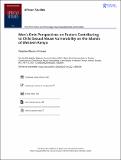Men’s Emic Perspectives on Factors Contributing to Child Sexual Abuse Vulnerability on the Islands of Western Kenya
Abstract/
Child sexual abuse (CSA) is a major global health concern. Although it
is prevalent in Kenya, there is scant literature on what factors
contribute to CSA vulnerability on Kenya’s islands. This paper is
based on a cross-sectional study of men’s perspectives on factors
contributing to CSA vulnerability on Kenya’s islands. This qualitative
study, therefore, focused on opinion leaders, children’s officers,
male community members, and boat owners from selected islands
(Mageta, Magare, Oyamo and Ndeda) in western Kenya. Several
factors emerged as contributing to CSA vulnerability on the islands:
social stigmatisation and cultural sensitivity of CSA, proximity to
social services, unrestricted migration, perceptions of legal costs,
lack of committed witnesses, and commodification of sex for
economic survival. This article recommends a local, targeted
campaign for these fishing communities that promotes common
goals, such as a safe and healthy environment for children, and
working together to achieve these goals. Such a campaign has the
potential to bring together a community to fight CSA and to
increase its bargaining power to reduce CSA vulnerability. When a
community does not agree on shared principles and expectations,
deviant behaviour such as CSA has room to flourish, because
community members cannot effectively organise themselves
against it. It is hoped that the findings in this article might
contribute some key insights on vulnerability experienced in remote
areas that might be used by policymakers

